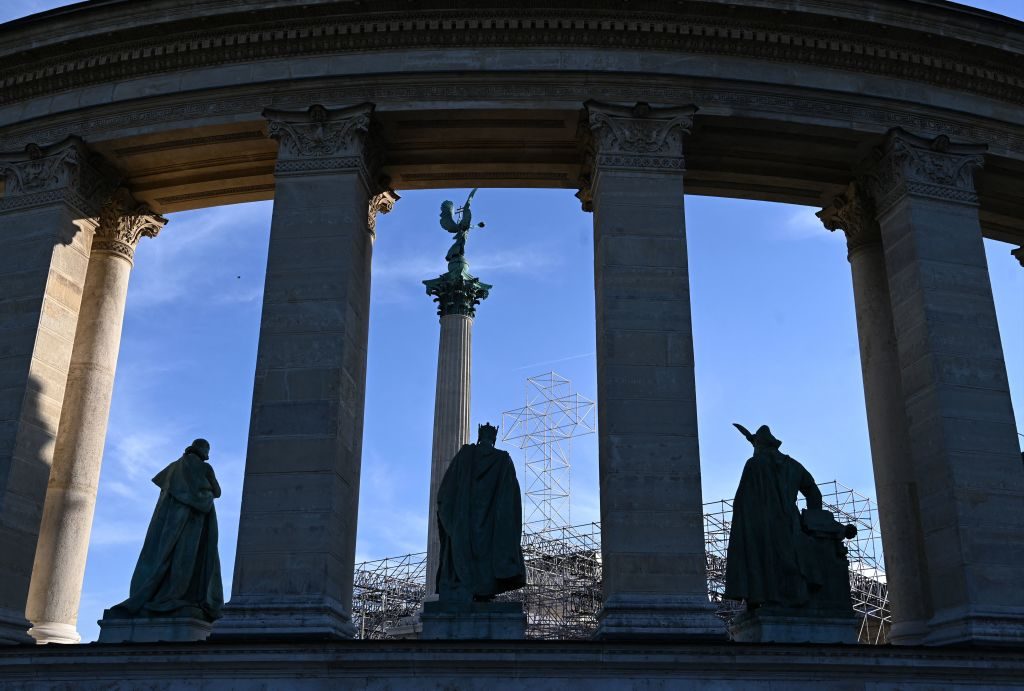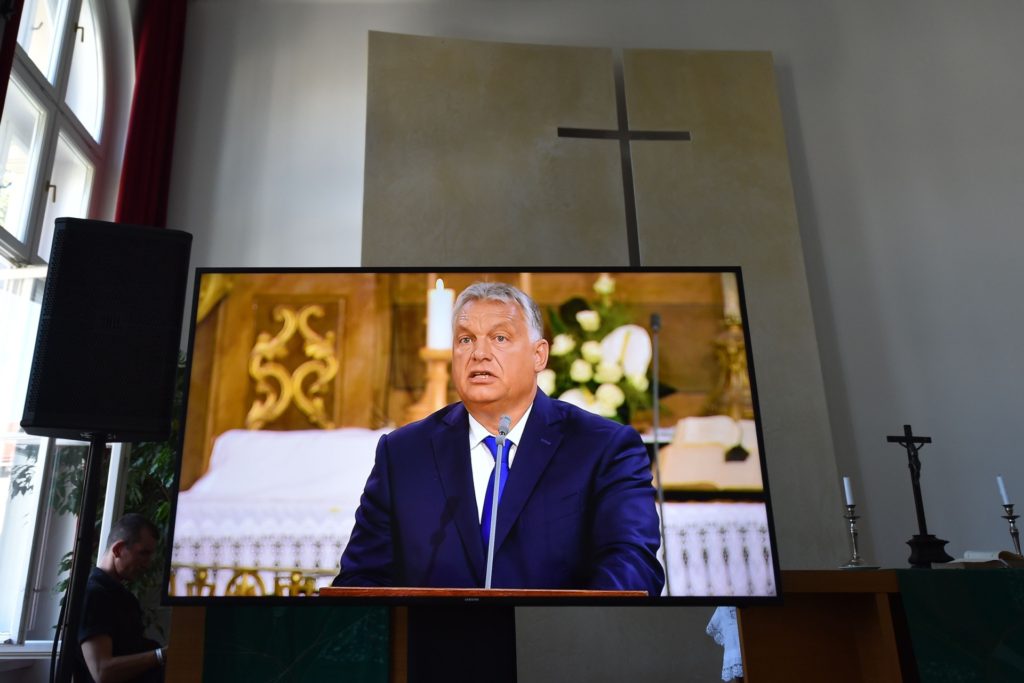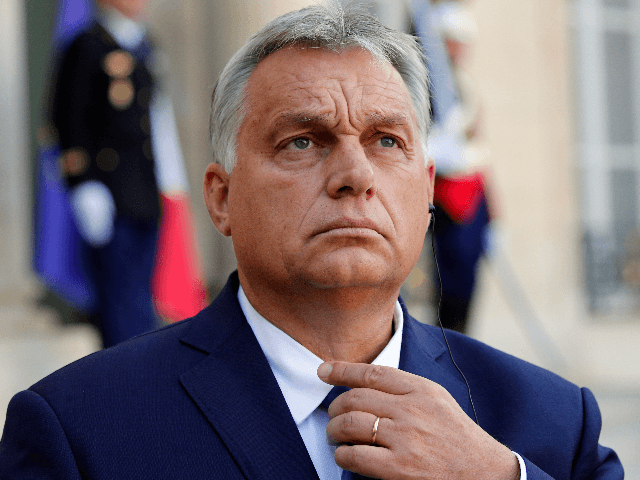ROME — The Vatican has confirmed that Pope Francis will meet with Hungarian Prime Minister Viktor Orbán next Sunday when visiting Budapest for the closing of the 52nd International Eucharistic Congress.
The meeting between the two leaders will take place at Budapest’s Museum of Fine Arts where Hungarian President János Áder will also be present.
Following the celebration of the closing Mass at the Eucharistic congress, the pontiff will fly to another Visegrád nation — Slovakia — for a three-day visit
The Visegrád group, which also includes Poland and the Czech Republic, has been a staunch ideological ally of the Catholic Church on a number of key moral and political issues involving the family, education, gender theory, and respect for human life at all its stages.
Poland, for instance, has stood firm in its decision to ban eugenic abortions of babies with Down syndrome and other anomalies despite aggressive pressure from the pro-abortion European Parliament to liberalize its position.
Leading the charge have been Poland’s Catholic bishops. The president of the Polish Bishops’ Conference, Archbishop Stanisław Gądecki, issued a powerful statement slamming the European Parliament’s resolution attacking Poland for its ruling, insisting that there is no such thing as “the right to abortion” and there can be “no right to kill an innocent person in any democratic legal order.”
In the case of Slovakia, which is about 65 percent Catholic, the nation plans to welcome the pope with open arms, although the bishops’ conference has gently suggested that he speak on spiritual rather than political issues.

In 2019 Prime Minister Viktor Orbán told a packed hall in the capital Hungary is proud of its Christian heritage and will do all in its power to defend its Christian identity. (Tom Williams/Breitbart News)
“For us, it would be very helpful if he encouraged us in our faith, for him to talk about Christ,” said Father Martin Kramara, spokesman for the Slovakian Bishops’ Conference, last July. “He’s the representative of Christ on earth, and he’s bringing Christ’s presence among us.”
“The entire country is already talking about the pope ahead of the visit, but also about God. This has become an issue,” he said.
People are “looking for something to believe in, something in which they can trust, hence I believe the pope needs to come and talk to us about Christ, about God,” he said.
For its part, Hungary has stood out for its vigorous defense of persecuted Christians and its effective approach of providing aid for them to remain in their homelands rather than emigrate.
In 2016, the Hungarian government established a Deputy State Secretariat for the Aid of Persecuted Christians, making it the only nation in the world with a department of this sort.
While mainstream media have attempted to play up differences between Pope Francis and Hungarian Prime Minister Viktor Orbán, the latter’s administration’s policies and priorities line up favorably with those of the Catholic Church.
Hungary has offered a model to the West of how to effectively address the widespread demographic crisis, enacting pro-family policies that have countered the “demographic winter” that Pope Francis denounces.
While European nations languish with rapidly declining birthrates, Hungary stands out with rising marriage rates, falling abortions, and its highest birthrate in 20 years.
The Orbán government has introduced seven family-friendly government programs encouraging Hungarians to have children in response to the European Union’s mass migration agenda. It has also resisted attempts to import gender theory into the nation’s schools, insisting on the understanding of humans as male and female.
“After we won the election in 2010 with a two-thirds majority, we decided to build a family-friendly country and to strengthen families raising children,” said Hungary’s Minister for the Family, Katalin Novak.

A giant cross can be seen with monuments of the Hungarian kings at the Heroes square in Budapest on September 9, 2021, the venue where the Holy Mass will be celebrated by Pope Francis as he pays a half-day visit to Budapest on September 12, 2021. (ATTILA KISBENEDEK/AFP via Getty Images)
In 2019, Orbán told a packed hall in Budapest that Hungary is proud of its Christian heritage and will do all in its power to defend its Christian identity.
“We are proud that our king Saint Stephen built the Hungarian State on solid ground and made our country a part of Christian Europe one thousand years ago,” Orbán said, citing Hungary’s constitution. “We recognise the role of Christianity in preserving nationhood.”
The prime minister said “Saint Stephen, our first Christian king, was an enlightened monarch, a visionary who wrote a guide for his son Emeric called ‘Admonitions’ that we Hungarians read as a personal message to each of us, both as a nation and as individuals, and it has been a source of our strength and flourishing.”
In his speech, broken up periodically by enthusiastic applause, the leader echoed words written by Pope John Paul II in the year 2000 to commemorate the 1000th anniversary of Hungary as a Christian nation.
“When St Stephen wrote his Admonitions for his son Emeric, was he speaking only to him?” the Polish pope asked. “Did he not write his Admonitions for all future generations of Hungarians, for all the heirs of his crown?”
“Your holy king, dear brothers and sisters of the Hungarian nation, left you as an inheritance not only the royal crown,” he said. “He left you the spiritual testament, a heritage of fundamental and indestructible values: the true house built upon the rock.”
In his address, Orbán said that despite its small size, Hungary has an important mission to play in the world.
“Hungarians make up only 0.02 percent of the world’s population, so how much difference can it make? Is it worth it?” Mr. Orbán asked.
He then proceeded to invoke the historical example of the 12 apostles, who changed the world by their Christian witness to the death and resurrection of Jesus.

Hungarian Prime Minister Viktor Orban is displayed on a screen set up at a press working space in an annexe of the protestant church in Sopron, Hungary, where he is giving a speech during an ecumenical service on August 19, 2019, that is part of celebrations to mark the 30th anniversary of the “Pan European Picnic” (ATTILA KISBENEDEK/AFP via Getty)
“Standing up for our persecuted brothers and sisters engenders courage in ourselves and others,” the prime minister continued. “When we raised Aid to Persecuted Christians to the level of a government ministry, who would have known how it would grow and influence others?”
“Christian persecution is not just a humanitarian issue,” Orbán insisted. “It is not just violence against individual persons or groups but an organized attack on an entire culture, including here in Europe.”
This attack takes many forms, some overt and some more subtle, he said, which includes “population exchange through mass migration, stigmatization, mockery, and the muzzle of political correctness.”
The prime minister also criticized Western Europe’s indiscriminate acceptance of mass migration as a time bomb for the future.
“Western Europe has already provided dozens of militants to the Islamic State,” he noted, “and uncontrolled immigration has produced a radical change in the demographics of the population.”
The only solution, he suggested, is for Europe to rediscover its Christian roots and identity.

COMMENTS
Please let us know if you're having issues with commenting.